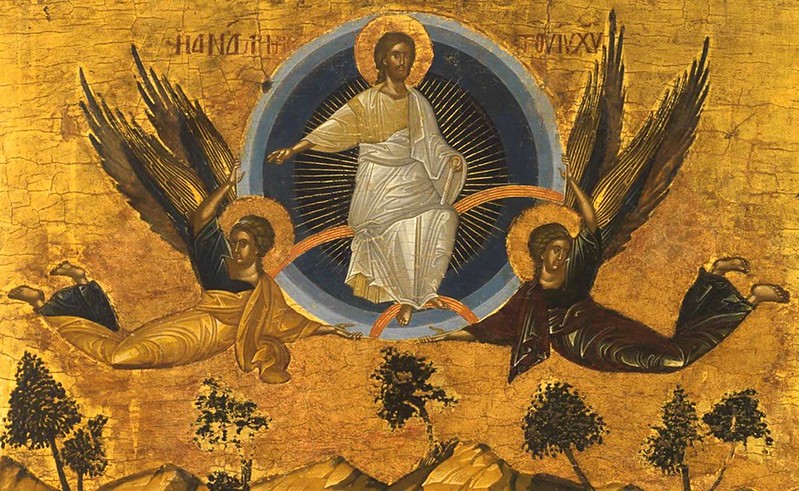Ascended, Not Absent

Ascended, Not Absent
Brian Zahnd
Ascension Day. It’s the most obscure of all the major holy days on the Christian calendar. Coming forty days after Easter, it commemorates the Ascension of Christ. The Christian calendar is designed to tell the gospel story from Advent to Pentecost. But most Protestants think the gospel story can be told with Christmas, Good Friday, and Easter alone. It’s safe to say that Ascension Day (Thursday, May 25) will come and go unnoticed and uncelebrated by most American Christians. (It may have a bit more recognition in Europe where it remains a public holiday.) That Ascension day for most American Christians is just another Thursday in Spring is telling. It tells of a deficient gospel and reveals a central problem in our political theology.
Too often we seem to regard the Ascension of Christ as a kind of awkward explanation for the absence of Christ. Well, after his resurrection, Jesus lifted off for outer space and is now hanging out with God in heaven until he comes back.
No. The Ascension is not about the absence of Christ, but about the ascendancy of Christ. The ascension of Christ to the right hand of God is the ascendency, the rise, the elevation, the promotion of Christ to the position of all authority in heaven and on earth. The right hand of God is not a cosmological location, but a poetic way of saying that God has now given all authority to Christ. The ascension of Christ does not lead to the absence of Christ, but to his cosmic presence everywhere. This is why the risen Christ says, “Behold, I am with you always, even to the end of the age.” In the Ascension Christ now “fills all things everywhere with himself.” There is now no place where Christ is not, and there is no domain over which Jesus is not Lord.
But that is not how most Christians have thought about the Ascension over the years. And this has had a detrimental effect upon our theology — especially our political theology. Let me explain.
If we end the gospel story of Jesus by saying… And then Jesus went off to heaven (which is why he’s not here), but someday he will come back and bring the kingdom of God… then we are free to run the world the way we want in what we assume is the absence of Christ. What this does is demote Jesus from being the Eternal Lord “seated at God’s right hand in the heavenly places, far above all rule and authority and power and dominion,” to being Lord-Elect in exile. If we imagine Jesus as being off somewhere in heaven waiting to come back someday and begin his reign, then we default to the idea that Caesar needs to rule the world in his Caesar-like way in the absence of Christ. No! The Ascension is ascendency, not absence! Jesus is Lord. Now. Not Lord-Elect, not Lord-Gonna-Be, not Lord-Someday, but King of kings and Lord of lords right now!
The kings (governments) of the world are not free to ignore Jesus Christ and his commands so they can run the world by violent and self-interested pragmatism. The kings of the earth are to be called to submit to the rule of Christ. The primary role of the church in regard to government is to be a prophetic witness in the name of the Lord Jesus advocating for peace, mercy, and justice. The church calls kings (governments) to obey Christ by promoting peace among the nations, prioritizing provision for the poor, and providing justice for the most vulnerable. The church is not to function as a toady to the king, but as a prophetic witness and an embodied presence of the King of kings.
It’s not the task of the church to “make America great again.” The contemporary task of the church is to make Christianity prophetic again. We must recover our vocation as a prophetic witness for the risen and ascended Christ. But to do this we must actually believe that Jesus is Lord of the nations here and now, and that all kings and governments, peoples and nations are called to obey the Son of God. This is what the pre-Imperial (pre-Constantine) church believed. These early Christians read Psalm 2 as speaking of Christ now.
Therefore, O kings, be wise;
be warned, O rulers of the earth.
Serve the LORD with fear
and rejoice with trembling.
Do homage to the Son,
lest he be angry,
and you perish in the way.
In the Apostles’ Creed we confess of Christ…
He ascended into heaven,
and is seated at the right hand of the father.
He will come again to judge the living and the dead.
But when we speak of Jesus coming again, it’s best not to think of Christ changing location, but of Christ appearing. When Christ “comes again” (the Parousia), the curtain is lifted and that which has always been the case is revealed. This is the moment of judgment — when we have to face how we have lived under the reign of Christ. The Parousia is not the beginning of the reign of Christ, but the moment in which we are judged by how faithfully we have obeyed the King.
Christ is not absent.
Christ has ascended.
Christ is not Lord-Elect.
Christ is Lord-Eternal.
Christ is not waiting to begin his reign.
Christ is reigning now from the right hand of the Father.
Christ is not far off.
Christ is with us always.
Christ is not separate from us.
Christ now fills all things everywhere with himself.
Amen.
BZ
1. Matthew 28:18
2. Matthew 28:20
3. Ephesians 1:23
4. Ephesians 1:20–21
5. Psalm 2:10–12